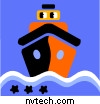Marti Rifkin and Arleen Sonkin
PRESENT

TABLE OF CONTENTS
- Classroom Display Maps
- Internet Support for project
- Classroom Rules
- Weekly Log
- Travel Bureau
- Tally of Points
- Travel Bonuses
- State – 75 points, 150 points
- World – Mexico, Central America, Canada, North America, Europe, South
America, Travel Bonus for Country
- Party Invitation
 PROGRAM OUTLINE PROGRAM OUTLINE
• Target students - Special Education Grades 4 & 5. This program is easily
adapted to enhance the regular education curriculum in grades 3 to 8.
• Major goals - This is a behavior management system that makes use of
technology while linking social studies, language arts and mathematics.
• Timelines – This is a year-long project which incorporates 2-4 periods weekly
depending on the interest and ability of students. Program can be adapted for a
second school year to incorporate world geography.
• Types of assessment used - Each week during the “Travel Bureau” period, the
students meet with their teacher to fill out their travel log. This is an
opportunity to review behavior and stress positive choices and improvement.
Filling out the log allows the teacher to note mathematical calculations and
skill in rounding numbers, as students convert points to miles. Map skills are
assessed, as each student must identify his present location, the direction in
which he is traveling, and the new state in which he has arrived. Reviewing
bonus projects the students have completed allows for assessment of individual
Internet research skills, as well as the ability to use Microsoft Word. Written
reports offer opportunities to review organizational skills and paragraph
writing.
 Standards - NYS LEARNING STANDARDS SUPPORTED BY THIS PROGRAM Standards - NYS LEARNING STANDARDS SUPPORTED BY THIS PROGRAM
ENGLISH LANGUAGE ARTS:
Standard #1: Students will read, write, listen and speak for information and
understanding.
Standard #4: Students will read, write, listen and speak for social interaction.
MATHEMATICS, SCIENCE AND TECHNOLOGY:
Standard #2: Students will access, generate, process and transfer information
using appropriate technologies.
SOCIAL STUDIES:
Standard # 3: Students will use a variety of intellectual skills to demonstrate
their understanding of the geography of the interdependent world in which we
live – local, national, and global – including the distribution of people,
places and environments over the earth’s surface.
 Curriculum Objectives Curriculum Objectives
Students become familiar with the location of states within the United States
or the location of countries and continents around the world.
Students learn facts about states, countries, or continents including flags,
capital cities, mottos, products, birds, and population.
Students use compass directions as they complete their weekly travel.
Students learn about geographic features such as oceans, borders, mountains,
rivers, and lakes.
Students learn to obtain facts from Internet sources and organize information
into written paragraph form.
Students learn to present written information to the class in oral
presentation form.
 Advance Preparation Advance Preparation
Student should be exposed to map skills and have simple
knowledge of how to locate information on the Internet
Internet Support
www.netstate.com
www.50states.com
www.theus50.com
www.geographic.org
www.eduplace.com/ss/maps
www.ipl.org/div/kidspace/stateknow
www.americaslibrary.gov (click
explore the states)
www.geographia.com
www.atlapedia.com |